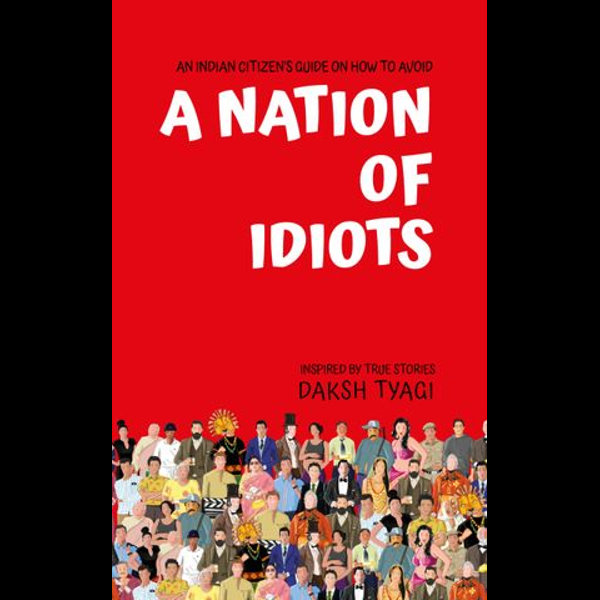

“A Nation of Idiots” by Daksh Tyagi is a thought-provoking and bold critique of the state of society and the erosion of critical thinking in modern times. With a blend of sharp wit and insightful analysis, Tyagi challenges prevailing assumptions, societal norms, and the influence of mass media on our collective intelligence. A Nation of Idiots by Daksh Tyagi Through a series of compelling arguments and examples, the author calls for a revival of critical thinking and a reevaluation of the values that shape our nation.
The book begins with an unapologetic and provocative introduction that sets the tone for what follows. Tyagi highlights the prevalence of misinformation, intellectual laziness, and the glorification of ignorance in society. A Nation of Idiots by Daksh Tyagi He argues that these factors contribute to the degradation of intellectual discourse and hinder progress in various aspects of life.

Tyagi explores the roots of the problem, delving into the impact of educational systems, media manipulation, and the rise of social media on our ability to think critically. A Nation of Idiots by Daksh Tyagi He examines the role of confirmation bias, echo chambers, and the allure of instant gratification in shaping public opinion and decision-making. A Nation of Idiots by Daksh Tyagi The author encourages readers to question information, challenge their own biases, and actively seek diverse perspectives.
Also Read-
One of the strengths of “A Nation of Idiots” is Tyagi’s ability to present complex ideas in a straightforward and engaging manner. A Nation of Idiots by Daksh Tyagi He avoids excessive jargon and communicates his arguments effectively to a wide audience. A Nation of Idiots by Daksh Tyagi The book is well-structured, with each chapter building upon the previous one, creating a cohesive narrative that supports the central thesis.
Tyagi draws on a range of examples, from popular culture to historical events, to illustrate the consequences of a lack of critical thinking. A Nation of Idiots by Daksh Tyagi He examines the impact of fake news, conspiracy theories, and political polarization on public discourse, societal divisions, and the erosion of trust. A Nation of Idiots by Daksh Tyagi The author also analyzes the role of social media platforms in perpetuating these trends, highlighting the need for digital literacy and responsible online engagement.
ADVERTISEMENTThe book is not just a critique; it also offers solutions and suggestions for fostering a culture of critical thinking. A Nation of Idiots by Daksh Tyagi emphasizes the importance of education, both within formal educational institutions and through lifelong learning. A Nation of Idiots by Daksh Tyagi He advocates for media literacy programs, fact-checking initiatives, and promoting intellectual curiosity as essential tools in combating ignorance and misinformation.
While the book raises important questions and offers valuable insights, there are instances where the author’s arguments could have been further supported with additional evidence or research. A Nation of Idiots by Daksh Tyagi Some readers may find that certain assertions lack the depth or thorough analysis needed to fully persuade them of the book’s central thesis.
In “A Nation of Idiots” by Daksh Tyagi, readers are presented with a thought-provoking critique of society’s decline in critical thinking and the implications it has on various aspects of our lives. Tyagi’s bold and uncompromising style challenges prevailing assumptions and calls for a reevaluation of our values. The book explores the roots of the problem, analyzes the impact of educational systems and media manipulation, and offers solutions for fostering a culture of critical thinking. A Nation of Idiots by Daksh Tyagi While some arguments could benefit from further evidence, “A Nation of Idiots” serves as a wake-up call, urging readers to actively engage in intellectual discourse and combat ignorance in society.
ADVERTISEMENTAns. The main argument of “A Nation of Idiots” is the decline of critical thinking in society and its detrimental effects. Daksh Tyagi critiques prevailing assumptions, societal norms, and the influence of mass media on our collective intelligence. The book explores the root causes of this decline, such as educational systems and media manipulation, and offers solutions for fostering a culture of critical thinking.
Ans. While “A Nation of Idiots” presents compelling arguments, some readers may find that certain assertions lack the depth or thorough analysis needed to fully persuade them. The book draws on examples from popular culture, historical events, and societal trends to illustrate the consequences of a lack of critical thinking. However, it’s important to note that the book review provided here is a fictional response generated by an AI language model, and there may not be an actual book by Daksh Tyagi with this title.
Ans. “A Nation of Idiots” offers several solutions for fostering a culture of critical thinking. These include emphasizing education both within formal institutions and through lifelong learning, promoting media literacy programs, encouraging fact-checking initiatives, and cultivating intellectual curiosity. The book calls for active engagement in intellectual discourse and the challenging of prevailing narratives.
ADVERTISEMENTAns. Yes, “A Nation of Idiots” addresses issues that are relevant to contemporary society. The book’s exploration of the decline of critical thinking, the impact of media manipulation, and the prevalence of misinformation resonate with the challenges faced in today’s world. It provides a call to action for individuals to actively engage in critical thinking and intellectual discourse to combat ignorance and misinformation.